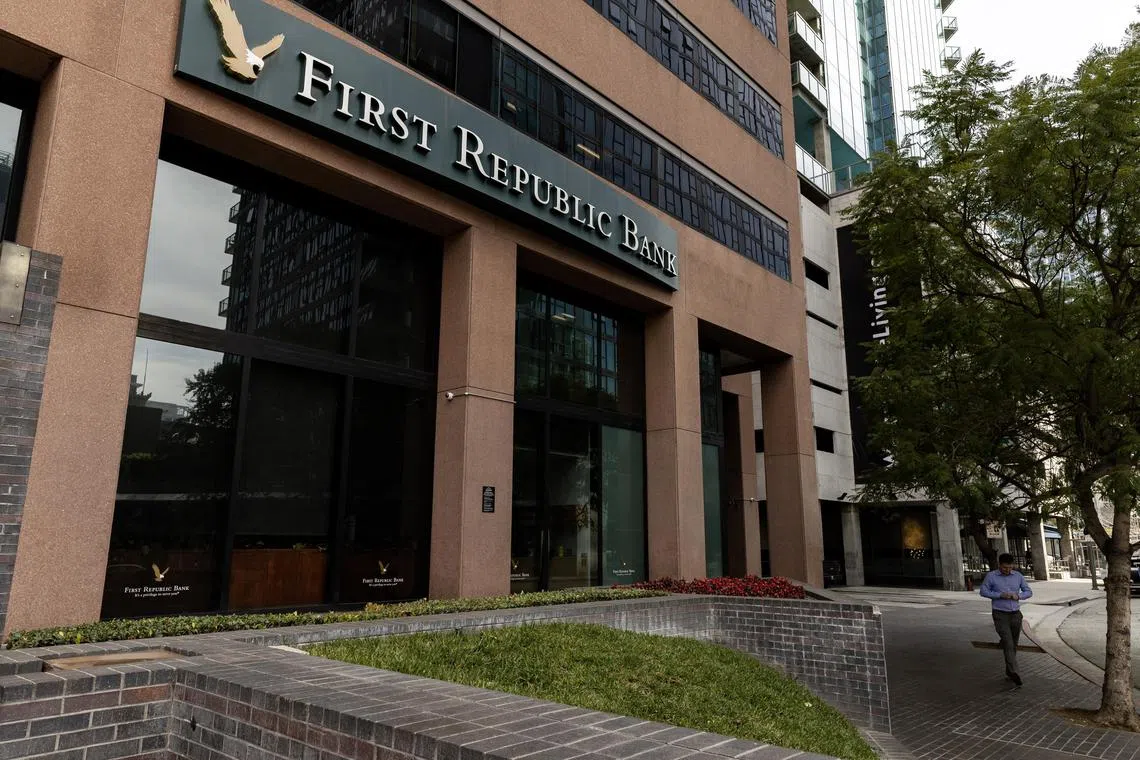US banks on ‘bumpy’ path as First Republic’s troubles deepen
Sign up now: Get ST's newsletters delivered to your inbox

First Republic Bank was downgraded by S&P Global Ratings for a second time on Sunday after being cut to junk status just days ago.
PHOTO: EPA-EFE
New York – Just weeks ago, they were bit players in the giant United States banking system. Now, a handful of regional lenders are at the heart of a crisis that has shaken the country.
At the last tally in the rapidly evolving turmoil, one of two collapsed lenders remained for sale while the fate of a third bank looked increasingly bleak. Billionaire investor Warren Buffett was in touch with the Biden administration about potentially providing aid, while smaller banks and lawmakers demanded that the government offer more protection for customer deposits.
The continued upheaval – despite regulators’ efforts to contain it – came amid another wrenching moment in banking: UBS agreed to buy Credit Suisse
“This is going to be pretty bumpy going forward,” Dr Mohamed El-Erian, chief economic adviser at Allianz and a Bloomberg Opinion columnist, told Bloomberg Television in an interview.
“People are doing something that probably is not rational but is totally understandable – they are moving deposits. That dynamic is not going to stop overnight, neither are the losses that are being incurred.”
Depositors have been fleeing regional lenders following the collapse of Silicon Valley Bank, after it failed to raise capital amid huge losses on its debt investments. In one day alone, depositors attempted to pull out US$42 billion (S$56.3 billion). The bank collapsed into receivership the next day and the Federal Deposit Insurance Corporation (FDIC) sought a sale.
On Sunday, Bloomberg News reported the FDIC was moving towards a break-up solution for the lender after a second auction failed to line up a buyer.
The pain quickly spread to other regional banks, prompting their shares to tumble. Moody’s Investors Service placed six regional banks on review for downgrade and cut the outlook for the entire US banking system to negative from stable, citing the runs on deposits.
Among them was First Republic Bank, which was downgraded by S&P Global Ratings for a second time on Sunday after being cut to junk status just days ago, even after the bank received US$30 billion from 11 US banks to stave off a potential collapse.
“The biggest open question is First Republic, which suffered a run after being somewhat unfairly linked to Silicon Valley Bank and Signature Bank,” said Mr Todd Baker, a senior fellow at Columbia University’s Richard Paul Richman Centre for Business, Law and Public Policy. “I am expecting a private capital infusion or an M&A (merger and acquisition) deal soon there, so that the bank can hold on to primary banking relationships with its core base of wealth individuals and their businesses.”
The future of one troubled regional bank was resolved late on Sunday: The FDIC announced that a subsidiary of New York Community Bancorp agreed to acquire key elements of New York-based Signature Bank, which was closed by state financial regulators a week ago and placed in FDIC receivership. Signature’s 40 branches will operate as Flagstar locations from Monday.
To assuage customers, US regulators unveiled extraordinary measures earlier in March, vowing to fully pay out uninsured deposits in the failed banks.
A coalition of mid-sized US banks asked federal regulators to extend FDIC insurance to all deposits for the next two years, Bloomberg reported on Saturday, arguing that the guarantee was needed to avoid a wider run on the banks and stabilise the sector. On Sunday, Senator Elizabeth Warren, a long-time Wall Street critic, also said more US deposits should be covered by federal insurance.
In contrast to Ms Warren’s enthusiasm, key lawmakers including House Financial Services Committee chairman Patrick McHenry have sounded a far more cautious tone. Others argue that increasing the deposit insurance limit could help shore up confidence.
“It is more a crisis of confidence triggered by one or two banks, and that confidence just needs to be restored,” said Dr Lawrence Baxter, a professor at Duke University’s School of Law.
Also on Sunday, the Federal Reserve and five other central banks announced coordinated action to boost liquidity in US dollar swap arrangements, the latest effort by policymakers to ease growing strains in the global financial system.
The crisis has drawn Berkshire Hathaway’s Mr Buffett into the fray. The investor – who has a long history of helping ailing lenders – has been in touch with senior officials in President Joe Biden’s administration as the regional banking crisis unfolded. The conversations have centred around Mr Buffett possibly investing in the US regional banking sector in some way, but the billionaire has also given advice and guidance more broadly about the current turmoil.
Complicating the issue is a two-day Fed meeting starting on Tuesday, during which chairman Jerome Powell and his colleagues will discuss the strength of US banks and the potential for a recession looming overhead.
The Fed’s next move will be closely watched as recent bank failures are stirring memories of the 2008 global financial crisis. Expectations have largely been shifting between the Fed delivering another quarter-point interest rate hike and taking a pause in its year-long effort to raise rates and reduce inflation. As developments are changing rapidly, rate hike expectations could shift yet again before Wednesday. BLOOMBERG


